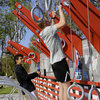Martin is on a journey to ‘help the horse world, one horse at a time’
BERNE — Anita Martin talks to horses.
As a certified equine sports massage therapist, she helps horses in pain.
“When horses are in pain,” she says, “they need help. They can’t tell us with words, but they certainly tell us with body language and action,” which can include biting, bucking, and kicking.
Martin has been familiar with horses since before she was born. Both of her parents rode horses. And, Martin’s mother rode horseback when she was pregnant with Martin, which she says made her comfortable in utero with the rhythm of riding.
In her book, “The Horse Less Traveled,” Martin writes that horses were the glue that kept her family together.
She describes her father as a “real hillbilly” who did trick riding at a mountain resort for city folk, which is how her parents met.
“My mother’s obsession for horses and my father’s rebellious James Dean personality. It was a perfect match!”
As a very young child, Martin writes, she would spend hours quietly observing horses. “There was something going on very deep inside me, as if I could hear them, as if I knew their thoughts. This was a connection that was very personal. This was a window that they allowed me to see into their world.”
As she grew older, Martin rode her pony, Candy, everywhere. “Being a quiet little girl my pony gave me courage and confidence,” Martin writes. With Candy, she felt secure, and that’s how people knew her as she traveled her neighborhood on horseback.
“I always felt like even my own feet were foreign to me,” Martin says in this week’s Enterprise podcast. “But being on top of a horse was more natural and comfortable. I was fascinated by them.”
By the time she was 13, neighbors turned to her for help with their horses.
“As time went on,” Martin said, “I realized that there’s a huge need for people in the horse world that aren’t exactly into showing or competing in any big fancy way, but just the down-to-earth people that love horses but don’t exactly have a whole lot of educational experience behind them.”
Sometimes, she said, people who have what they consider problem horses let them go to auction for slaughter, “which has devastated me …,” Martin said. “I made myself a promise that I would do whatever it took — one horse at a time — to change that and help prevent that.”
The last slaughterhouses in the United States were closed in 2007 but, according to the American Society for the Prevention of Cruelty to Animals, tens of thousands of American horses continue to be trucked to slaughter in Mexico and Canada — an average of 137,000 from 2012 to 2016, although that number dropped to about 23,000 in 2021.
Ending the slaughter of horses, Martin believes, lies in teaching humans.
“If you can educate people, you can help horses,” she says.
Martin is often called on by horse owners who have fallen on hard times — they are elderly or have run into medical or financial problems. She is asked, “What do I do? … The horse hasn’t been ridden in years so I can’t really sell it as a rideable horse.””
There are also people who hear, “‘Oh, a free horse. I’ll jump on that’ — not really knowing and understanding the responsibility and proper care,” says Martin.
Although there are horse rescue groups and horse sanctuaries, Martin said, “COVID affected their donations quite a bit … so it’s a ripple effect and it’s actually a really large problem in the United States, the overpopulation of recreational horses that end up at auctions that end up at slaughter.”
She went on, “So I’m on this journey to help the horse world, one horse at a time.”
Even in her youth, being consulted by neighbors, Martin knew instinctively that problem horses “didn’t just automatically turn evil … I believed they were in pain.”
Learning equine massage changed the course of her life. Martin stresses, “It’s not feel-good massage; it’s actually healing the muscle trauma and pain — pain management.”
Martin lives in East Berne — at Dancing Horse Farm — with nine of her own horses and three belonging to friends, but has worked with horses up and down the East Coast.
Martin believes ill-fitting saddles are the culprit in a lot of cases and says she learned about proper saddle-fitting from an old cowboy.
Martin, herself, learned to ride bareback. Her book opens with a picture of her as a very little girl in a dress perched happily on her pony’s back.
“I have my mother to thank for that,” she says of her ease with riding bareback. “When you sit on a horse, you’re actually sitting on their spine, the central nervous system.” Riding bareback, she says, “You can feel every move they make.”
Martin notes that a horse can feel a fly land on its back and flick its skin to be rid of the fly.
“They can feel you and you can feel them,” she says of riding bareback. “You can feel their thoughts because their brain has to relate to their body. ‘Oh, there’s a monster up there,’” she imagines the horse thinking of its rider.
“You can feel their body tense up,” she goes on. “Therefore, you can control the situation so nobody gets hurt …. So the message is going back and forth, and human to horse.”
When Martin teaches someone to ride, she starts them out bareback so that they develop a sense of balance and learn to read the horse. “They actually can control the horse through their hands with the reins,” she said.
She likens riding a horse with a saddle to riding a bicycle with “an encyclopedia between you and the seat to the bike — it would feel so weird.”
When Martin moved to Albany County a few years ago, she was amazed by the number of horses.
“They were all over the place and I thought: Wouldn’t it be great to get together somehow?”
Currently, Martin said, “Horse people have to travel outside of the state to attend equine festivals.” She named one in Pennsylvania and another in Massachusetts.
But she is changing that by organizing the Everything Equine Festival to be held June 17 and 18 at the Altamont fairgrounds.
Her goal, Martin said, is to “get the horse people together, network, help each other support each other, support the horse industry in the community and in the county and New York state.”
Events at the festival will take place at three different arenas, Martin said. There will be a drill team, a vaulting team, a roping demonstration, a freestyle demonstration, vendors, and clinics.
“There’s going to be tables where you can talk one-on-one with these clinicians,” she said. Topics ranging from adopting a mustang to equine first aid will be addressed.
There will also be entertainment, including live music, food and beer, as well as crafters and artists.
Martin concludes her book by saying she never followed the mainstream with anything, especially in the horse world.
She forged her own trail, she writes, and, as with taking the road less traveled, acts independently.
Yet she acknowledges the importance of seeking assistance when needed. She concluded the podcast by urging people with horse problems to reach out for help.
People who have horses and don’t understand what is going on with their horse or who have run into hardship, Martin says, should “reach out to horse people because the horse community is amazing and it’s really all about the horses.”
****
The Everything Equine Festival will be held June 17 and 18 at the Altamont fairgrounds. Tickets cost $10 for adults and $5 for kids 6 to 12 years old; admission is free from children younger than 6. Anyone interested to volunteer for the festival can email Anita Martin at EverythingEquieFestival@gmail.com or text her at 845-706-6687.



